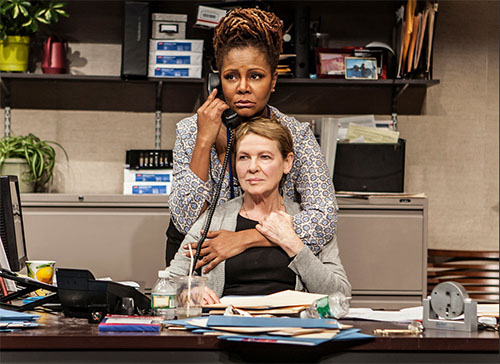By MARK BLANKENSHIP
Welcome to
Building Character, our ongoing look at performers and how they create their roles
You might assume that Tonya Pinkins focuses on the conflict in
Rasheeda Speaking. After all, Joel Drake Johnson's play, now in a New Group production at the Signature Center complex, basically turns a Chicago doctor's office into a war zone.
From the first scene, it seems the decks are stacked against Pinkins' character Jaclyn, who works in a reception area with her white co-worker Ileen (Dianne Wiest). The doctor wants Jaclyn replaced, and he enlists Ileen to gather proof that she deserves to be fired. But as soon as Jaclyn catches wind of the plot, she goes on the defensive, working angle after angle to protect her job. This battle chips at everyone's professionalism until their true feelings about race, class, and power burst into view. By the end, everyone's wounded, everyone's guilty, and it's hard to say who's right or wrong.
But for all that, the actors focus their performances on how much Jaclyn and Ileen like each other. "The two of us were in agreement about the fact that what needed to be on that stage is a friendship between two people," says Pinkins. "We knew that if we could play the friendship until [the script] absolutely says the friendship is over, then that would hold up the play and make it have a devastating effect on people. No matter what we're saying, we're trying to stay connected and bridge whatever's going on."
That's why, for instance, the actors find so many opportunities to touch each other, to pat shoulders or even embrace. Those moments remind us that beyond the situation their boss has put them in, beyond their personal agendas and fears and flaws, they are fundamentally decent. "If that friendship is not there, then it's just a play about a bunch of really nasty, cruel, lying, deceptive people," Pinkins says.
At the same time, the blunt facts of racism also compel Pinkins to shade her performance with compassion and vulnerability. "I'm a large black woman," she says. "Dianne is a small white woman. Just that physical relationship on the stage---the first appearance of that is going to make it look like I'm the bad guy. That's going to be a visceral response."
She continues, "So many black people who have seen the play have come up to me and said, 'Oh my god, that's my situation. I'm working in an office, and this white woman starts crying, and now I'm in trouble. I'm gonna get fired because I made a white woman cry.' So if Dianne's gonna raise the stakes and go to tears, I have that awareness that something has to be done."
In other words, Pinkins needs to make sure Jaclyn short circuits the assumptions that the characters in the play (and possibly some of the people in the audience) have about her. That keeps us off-kilter as everyone on stage becomes sympathetic and hissable at the same time.
"Every exchange we have---how much time we take to say something, how much time we take to respond---switches our perceptions," Pinkins says. "And we've played with that. When am I hard to her? When is she hard to me? When am I hurt? When is she hurt?
"It's this seesaw going up and down, and you don't know where you're going to end up. And that's when it's at its best."
---
Mark Blankenship is TDF's online content editor
Photo by Monique Carboni
